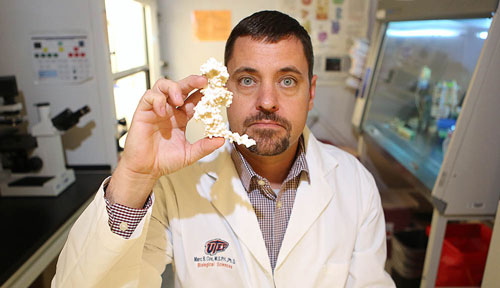Originally published June 8, 2016
By Lisa Y. Garibay
UTEP Communications
One researcher’s critical work on treating breast and prostate cancer is saving lives as well as turning heads.
Marc Cox, Ph.D., associate professor in The University of Texas at El Paso’s Department of Biological Sciences, has been selected as the 2016 Texas Inventor of the Year for his treatments, which he developed at UTEP.

The Intellectual Property Committee of the State Bar of Texas selected the researcher from a highly competitive field of nominees.
“Dr. Cox’s research has resulted in an entirely new class of drugs that bypass the hormone sensors all together and instead block internal messages within cancer cells, so the cancer acts as if its hormone sensors are ‘off’ and does not grow,” said Michelle Lecointe, chair of last year’s Inventor of the Year committee.
“Without a constant message to grow, the cancer may die partially on its own or become much easier to kill with combination treatment,” Lecointe added.
Cox is the first awardee from a university and will receive his award at the Annual Meeting of the State Bar of Texas in Fort Worth on June 17, 2016.
Prostate and breast cancer growth is frequently driven in response to the body’s own hormones. As a result, many current therapies include hormone-blocking agents.
However, a significant number of cancers develop the ability to grow even in the absence of hormones because their hormone sensors become stuck in an “on” state that normally only occurs in response to hormones, making them resistant to hormone-blocking treatments. Such treatment-resistant cancers account for a significant proportion of deaths for those diagnosed with breast and prostate cancer.
Cox developed drug candidate medications that target a critical protein for androgen receptor signaling, which is a process that these cancers are dependent on for growth. Pharmaceutical compounds developed by Cox will help pave the way for the development of similar technologies that have fewer undesirable side effects than current treatments, thereby improving patients’ quality of life.
The educator was excited and honored to have been named the 2016 Inventor of the Year.
“As a scientist, nothing would satisfy me more than to see my work directly contribute to increasing patient quality of life, and my efforts in technology development and commercialization are necessary steps toward that ultimate goal,” Cox said. “Recognitions such as this provide strong validation of my technology development efforts, and of the great strides that UTEP has made toward fostering and supporting highly competitive research.”
Preliminary findings suggest that Cox’s therapeutic strategy will lead to more potent and effective drugs. These drugs will likely demonstrate efficacy toward the treatment of breast and prostate cancers, either alone or in combination with existing therapeutics.
“Cox is adding new weapons to the clinicians’ arsenal of treatments that will provide greater options for the design of individualized and/or combination therapies, and significantly contribute to the reduction of death from prostate or breast cancer,” said Roberto Osegueda, Ph.D., vice president for research at UTEP.
Novel technologies and new goods are at the heart of economic progress, and the major long-term economic benefits of novel drug technologies include increased longevity of patients, reduced limitations on patient activities including working, and reduced medical expenditures.
Six patents related to Cox’s breast and prostate cancer treatments are currently pending and issued.
“These novel drug technologies and their development toward commercialization attract funding that benefits the University, The University of Texas System and the regional economy through increased research expenditures and the creation of jobs,” said Melissa Silverstein, director of UTEP’s Office of Technology Commercialization.
To date, these technologies have attracted close to $2.3 million in research funding and created at least five new jobs within the academic research sector in Cox’s lab at UTEP.
Cox is currently working with scientists from the National Institutes of Health, Texas Southern University, Clark Atlanta University and the University of Colorado to conduct pre-clinical studies, and is in discussion with collaborators to design the initial clinical testing of the compounds.